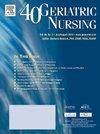Higher prognostic nutritional index is associated with lower incidence of sarcopenia
IF 2.5
3区 医学
Q3 GERIATRICS & GERONTOLOGY
引用次数: 0
Abstract
Sarcopenia is a syndrome of progressive, generalized decline in skeletal muscle function and muscle mass. As one of the key factors affecting sarcopenia, nutritional status plays an important role in the occurrence and development of sarcopenia. Therefore, this study selected the National Health and Nutrition Examination Survey (NHANES) database to study the effect of prognostic nutritional index (PNI) on sarcopenia. A total of 8058 adults were included in this study. In multiple linear regression analysis, PNI levels were significantly negatively associated with sarcopenia [0.89 (0.85,0.93)]; The risk of sarcopenia was reduced by 52% in the highest quartile of PNI compared with the lowest quartile [0.48 (0.31,0.74)]; This negative association was sustained in stratified subgroups. According to the generalized additive model and the results of smooth curve fitting, PNI was negatively associated with sarcopenia. Higher PNI was associated with a lower incidence of sarcopenia.
预后营养指数越高,肌肉疏松症的发病率越低
骨骼肌减少症是一种进行性、全身性骨骼肌功能和肌肉质量下降的综合征。作为影响肌少症的关键因素之一,营养状况在肌少症的发生发展中起着重要作用。因此,本研究选择国家健康与营养调查(NHANES)数据库,研究预后营养指数(PNI)对肌肉减少症的影响。本研究共纳入8058名成年人。在多元线性回归分析中,PNI水平与肌肉减少症呈显著负相关[0.89 (0.85,0.93)];与最低四分位数相比,PNI最高四分位数的肌肉减少症风险降低了52% [0.48 (0.31,0.74)];这种负相关在分层亚组中持续存在。根据广义加性模型和光滑曲线拟合结果,PNI与肌肉减少症呈负相关。较高的PNI与较低的肌少症发生率相关。
本文章由计算机程序翻译,如有差异,请以英文原文为准。
求助全文
约1分钟内获得全文
求助全文
来源期刊

Geriatric Nursing
医学-护理
CiteScore
3.80
自引率
7.40%
发文量
257
审稿时长
>12 weeks
期刊介绍:
Geriatric Nursing is a comprehensive source for clinical information and management advice relating to the care of older adults. The journal''s peer-reviewed articles report the latest developments in the management of acute and chronic disorders and provide practical advice on care of older adults across the long term continuum. Geriatric Nursing addresses current issues related to drugs, advance directives, staff development and management, legal issues, client and caregiver education, infection control, and other topics. The journal is written specifically for nurses and nurse practitioners who work with older adults in any care setting.
 求助内容:
求助内容: 应助结果提醒方式:
应助结果提醒方式:


